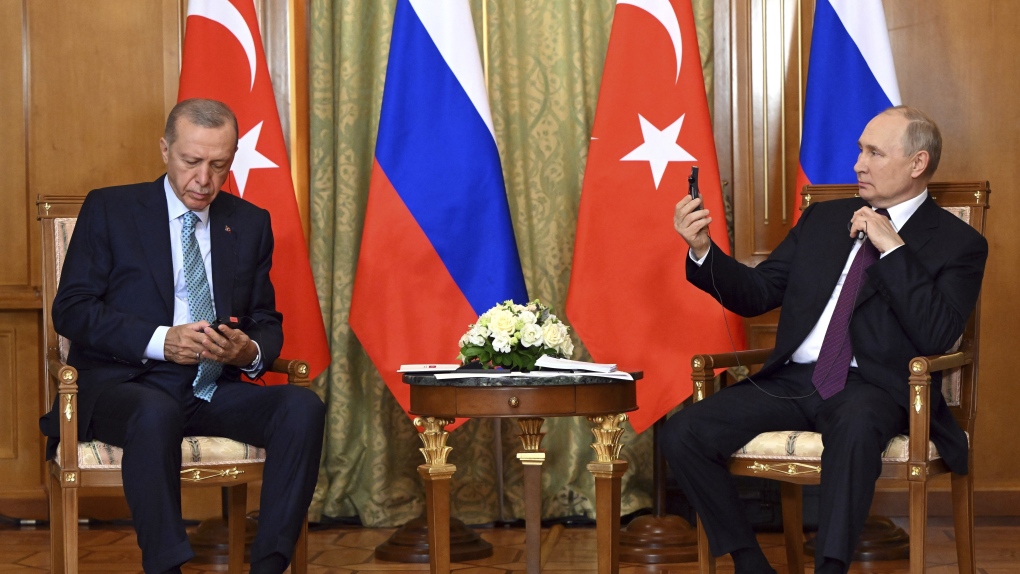Russian President Vladimir Putin has reiterated his stance on reinstating a United Nations-brokered deal to safely ship Ukrainian grain across the Black Sea only after the West meets Moscow’s demands on its agricultural exports.
The Russian president’s remarks on Monday came after a meeting with his Turkish counterpart Recep Tayyip Erdogan in the Black Sea city of Sochi in the hope of reviving the agreement seen as vital for global food supplies, especially in Africa, the Middle East and Asia.
Russia refused to extend the deal in July, complaining that a parallel agreement promising to remove obstacles to Russian exports of food and fertiliser had not been honoured. It said restrictions on shipping and insurance hampered its agricultural trade, though it has shipped record amounts of wheat since last year.
Putin reiterated those complaints and said that the Black Sea corridors should not be used for military purposes. He told reporters that if those commitments were honoured, Russia could return to the deal “within days”.
Erdogan also expressed hope that a breakthrough could come soon. He said Turkey and the UN – which both brokered the original deal – have put together a new package of proposals to unblock the issue.
“We believe that the initiative should continue by fixing the shortcomings,” said the Turkish president who has taken on the role of mediator between Ukraine and Russia. It was the first meeting between the two leaders since Erdogan’s re-election for a third term as president in May.
Video Duration 02 minutes 15 seconds 02:15The Black Sea grain deal is off so what happens now?
The United States and the European Union have dismissed Moscow’s complaints as without merit, saying their sanctions do not target
Russian grain and fertilisers.
A failure to revive the agreement will have “drastic impacts” in several African countries that rely heavily on Ukrainian and Russian grain, experts say.
In an effort to address that, Putin told reporters in Sochi that Moscow is weeks away from supplying free grain to six African countries.
“We are close to completing agreements with six African states, where we intend to supply foodstuffs for free and even carry out delivery and logistics for free,” he said.
“Deliveries will begin in the next couple of weeks.”
The Russian leader alleged that a large chunk of the grain exported via the Black Sea deal went to the West instead of the poor countries.
Hopes dashed in Turkey
Hopes were high in Turkey that Erdogan would be able to convince Putin to return to the Black Sea grain deal, Al Jazeera’s Resul Serdar reported from Istanbul.
“Officials here say Ankara is trying to convince some of the Western countries to let Russia, in a limited way, back to the international payment system,” Serdar said, adding that insurance companies would now also provide insurance to Russian ships that are going to carry Russian grain and fertiliser.
“It will be a major step if it happens. [It means] Russia is going to breach the international sanctions that were imposed particularly by the West,” he added.
Erdogan has maintained close ties with Putin during the 18-month war in Ukraine. Turkey has not joined Western sanctions against Russia following its full-scale invasion, emerging as a main trading partner and logistical hub for Russia’s overseas trade.
NATO member Turkey, however, has also supported Ukraine, sending arms, meeting Ukrainian President Volodymyr Zelenskyy and backing Kyiv’s bid to join the alliance.
‘Ukraine is finding ways to export its grain’
According to Al Jazeera’s Rob McBride in Kyiv, the outcome of the meeting in Sochi has been treated with “cynicism” in Ukraine.
“People [are] saying it was Russia that invaded Ukraine and turned the Black Sea into a war zone, pointing at Russia’s attacks on Ukraine’s grain exporting infrastructure,” McBride said.
Russia has ramped up drone and missile attacks on Ukrainian grain ports and storage infrastructure. Ukraine says tens of thousands of tonnes of grain have been destroyed in the process.
Ukraine has set up its own corridor since the end of the grain deal – from the port of Odesa – but Russia has threatened to treat all ships calling at Ukrainian ports as potential military targets.
“We have had two more ships making a passage to the Black Sea from Odesa,” Mc Bride said.
“Ukraine is finding ways to export its grain with or without help from Russia.”
‘Russia is exacerbating global hunger’
The EU has condemned recent Russian attacks on Ukrainian infrastructure used for exporting grain.
A spokesman for EU foreign affairs chief Josep Borrell said the attacks show how Russia’s actions are increasing global food prices and putting millions of vulnerable people around the world at risk.
Meanwhile, German Foreign Minister Annalena Baerbock slammed Putin’s decision to block the Black Sea grain deal, accusing him of playing “cynical” games.
Baerbock said Erdogan’s efforts to “get the agreement back on track” were important.
“It is only because of Putin that the freighters do not have free passage again,” she said, referring to ships loaded with Ukrainian grain that have been stuck in the country’s Black Sea ports since July.


